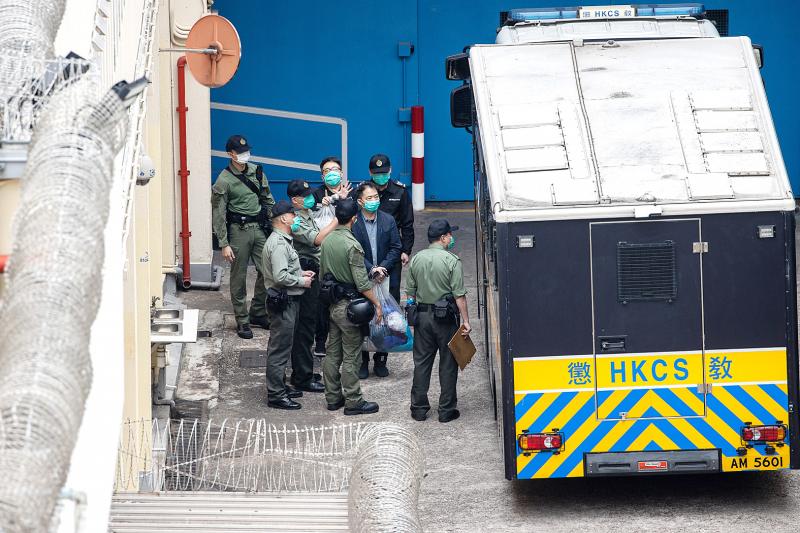Hong Kong has made its 100th arrest under the National Security Law imposed on the former British colony by China last year, while dozens of democracy advocates yesterday returned to court for a mass bail hearing before their trial on subversion charges.
Former Next Digital executive director Stephen Ting (丁家裕) was detained on fraud allegations, the Oriental Daily newspaper reported, citing people it did not identify.
Police issued a statement late on Tuesday confirming the arrest of a 61-year-old man “after in-depth investigation by national security department.”

Photo: EPA-EFE
They did not name the person or his affiliation with Next Digital.
As of Tuesday, 100 people have been arrested on suspicion of activities harming national security, police said in a separate statement yesterday.
The accused include 83 male suspects and 17 female suspects, ages 16 to 79, police said.
One of the most high-profile operations under the security law involved the arrest of 55 opposition figures in January. They were rounded up for taking part in an unofficial primary election and accused of trying to gain a majority in the Hong Kong Legislative Council to paralyze the government.
Forty-seven of those people were attending a third day of arraignment hearings to decide whether they would receive bail before their subversion trial. The defendants included some of the territory’s most prominent democracy advocates such as Joshua Wong (黃之鋒), Benny Tai (戴耀廷) and Jimmy Sham (岑子傑), and most have objected to government requests to keep them in jail while also delaying further proceedings until at least May 31.
The case comes before an annual meeting of the Chinese National People’s Congress opens in Beijing tomorrow, with senior officials calling for lawmakers to overhaul Hong Kong’s election system to further diminish the influence of pro-democracy politicians.
Hong Kong Chief Executive Carrie Lam (林鄭月娥) plans to travel to Beijing to attend the opening ceremony.
Before the hearing started yesterday, the owner of a local diner brought food and drinks to supporters of the defendants outside the courthouse.
“I want to support the people here,” Cheong Wong said. “This is the least I can do.”
Amnesty International Hong Kong was critical of the hearing on Monday, which started at 11am and ended about 3am the following day when one defendant fainted.
Three others went to the hospital after saying they felt unwell, local media reported.
An extended hearing “along with insufficient time to rest could potentially violate the right to a fair trial, and such a violation could warrant legitimate grounds for an appeal,” Amnesty International Hong Kong program manager Lam Cho Ming (林祖明) said. “Fair trial rights demand that there must be adequate time and facilities to prepare the defense.”

‘IN A DIFFERENT PLACE’: The envoy first visited Shanghai, where he attended a Chinese basketball playoff match, and is to meet top officials in Beijing tomorrow US Secretary of State Antony Blinken yesterday arrived in China on his second visit in a year as the US ramps up pressure on its rival over its support for Russia while also seeking to manage tensions with Beijing. The US diplomat tomorrow is to meet China’s top brass in Beijing, where he is also expected to plead for restraint as Taiwan inaugurates president-elect William Lai (賴清德), and to raise US concerns on Chinese trade practices. However, Blinken is also seeking to stabilize ties, with tensions between the world’s two largest economies easing since his previous visit in June last year. At the
Nearly half of China’s major cities are suffering “moderate to severe” levels of subsidence, putting millions of people at risk of flooding, especially as sea levels rise, according to a study of nationwide satellite data released yesterday. The authors of the paper, published by the journal Science, found that 45 percent of China’s urban land was sinking faster than 3mm per year, with 16 percent at more than 10mm per year, driven not only by declining water tables, but also the sheer weight of the built environment. With China’s urban population already in excess of 900 million people, “even a small portion

UNSETTLING IMAGES: The scene took place in front of TV crews covering the Trump trial, with a CNN anchor calling it an ‘emotional and unbelievably disturbing moment’ A man who doused himself in an accelerant and set himself on fire outside the courthouse where former US president Donald Trump is on trial has died, police said yesterday. The New York City Police Department (NYPD) said the man was declared dead by staff at an area hospital. The man was in Collect Pond Park at about 1:30pm on Friday when he took out pamphlets espousing conspiracy theories, tossed them around, then doused himself in an accelerant and set himself on fire, officials and witnesses said. A large number of police officers were nearby when it happened. Some officers and bystanders rushed

Beijing is continuing to commit genocide and crimes against humanity against Uyghurs and other Muslim minorities in its western Xinjiang province, U.S. Secretary of State Antony Blinken said in a report published on Monday, ahead of his planned visit to China this week. The State Department’s annual human rights report, which documents abuses recorded all over the world during the previous calendar year, repeated language from previous years on the treatment of Muslims in Xinjiang, but the publication raises the issue ahead of delicate talks, including on the war in Ukraine and global trade, between the top U.S. diplomat and Chinese